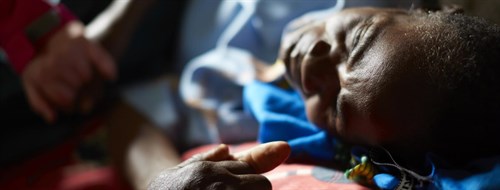Hungry and in Pain
Just carrying morphine is not enough when people are hungry and in pain.
8 Aug 2016Malawi, along with other southern African nations, is facing a food crisis after devastating floods and prolonged droughts crippled food supplies. This adds to the challenges of meeting the holistic needs of people receiving palliative care.
The government of Malawi has declared a national emergency and, along with our partners, is asking for help. EMMS International has launched a food crisis appeal to help some of the 6.5 million people facing hunger, with a focus on the most vulnerable. Gifts to the appeal are being matched by the Scottish government.
Home-based patients are among the hardest hit. Family members who act as caregivers must also ensure the family can eat. In the face of hunger and malnutrition they are forced to choose between survival and caring for loved-ones. Care for those who are sick is unavoidably compromised.

Hunger means patients' needs change. Food scarcity pushes up the cost of living. Food becomes the most pressing issue. Patients can be left in unbearable pain when guardians are forced to find food or extra income and can no longer visit the hospital to collect medication.
As a result, our partners are having to change their care to meet patient needs. Dr Cornelius Huwa, Medical Director of Palliative Care Support Trust (PCST) in Malawi, says:
“We are now seeing an increase in the demand for social support over and above general medical support that we offer. We carry food supplements when going for home visits. Just carrying morphine is not enough when people are hungry and in pain.”
Click here to read the full article
Doctors can lead the way to healthier drug policies – join IDHDP now
Share this on: